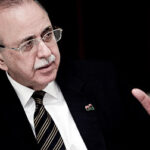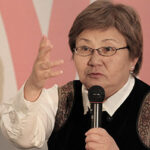President Roza Otunbayeva said, during her presentation at the ECOSOC session “From the MDGs to SDGs”, that Central Asian countries had demonstrated that education is the most important factor to unlock development gains. Her country had graduated from socialism with almost 100 per cent literacy, she added, stressing the need to build on such accomplishments. “Education is the bridge between poverty and prosperity”, she said. The Millennium Development Goals on education had unleashed unprecedented progress, but they had not focused on inclusiveness. The declining trend in aid for education must be reversed and new sources of financing identified, she said. North-South and South-South educational exchanges should be expanded. It was critical to tap the youth dividend by putting education first.
Turning to the issue of migration, President Roza Otunbayeva said that migrant workers’ remittances were the second largest source of development financing. Hundreds of thousands of Kyrgyz citizens went abroad to work for meager wages and faced unsafe or unfair working conditions. She urged all Member States to pay particular importance to target 8.8 of the sustainable development goals promoted safe working conditions for migrant workers and those in precarious employment.
President Otunbayeva noted that she is a Member of the Club de Madrid and it has been promoting social inclusion through the Shared Societies Project. “Shared Societies is based on the idea that no one is left behind: one of the key messages of the SDGs”. She also stressed that diversity and cultural expressions must be part of the education programs.
She drew Representatives attention to the Open Letter that was circulated recently by Club de Madrid “Shared Burden: Shared Benefits”
At the session “Lessons from the MDGs for the future” held on Thursday 9 July, Prime Minister Zlatzo Lagumdzija said that much had been gleaned from the successes and failures of the past 15 years of development policy. Among those lessons was that specific issues, including education and health, could not be tackled without dealing with root causes such as poverty and inequality by building the foundation of a Shared Society. “We have to work together,” he said, both the rich and the poor, to mobilize efforts towards the Sustainable Development Goals, a new paradigm based on a set of common values.
“The Club de Madrid is promoting shared values as an effort to create peace. Violent extremism started when shared society and values stopped, and vice versa”, he said. “We either learn to get along or we are finished,” stressed Prime Minister Lagumdzija: “We really do not have another alternative.”
Prime Minister Abdurrahim El-Keib mentioned during his presentation at the final session “Strengthening and building institutions for policy integration in the post-2015 era” the case of Libya historic first elections after the Gadaffi era as an example of political inclusiveness in a diverse society such as of Libya. Prime Minister El-Keib stressed that “leaders must not deny the rights and aspirations of all members of society irrespective of their ethnic background, gender or political beliefs, a basic principle of Shared Societies”. Technical mechanisms or money alone cannot build peace, he said, highlighting that solutions are in the intersection of the political and the economic processes, a deep understanding of the sociopolitical environment of the country, constructive dialogue, national reconciliation and the creation of inclusive societies. Prime Minister El-Keib stated that it is important to ensure the building of an inclusive Shared Society with the participation of all sections of society. He also called for inclusion at the intergovernmental level to ensure the right kind of support for less developed states. “it is in everyone’s interests that less developed states become more developed states.
The Secretary General of the United Nations, Ban Ki-Moon, contributed to the closing session.
The mission also included bilateral meetings with representatives of UNDESA and other UN staff, and Permanent Representatives to the United Nations including the Kenyan co-facilitator of the Post-2015 process, Denmark, France and the United Kingdom. In addition, an event was help at Quaker House, co-organized by Club de Madrid and the Quaker United Nations Office under the title “From conflict to Development: Connecting high level policy discussions to the reality of countries in transition”. In an informal session the Members shared lessons from their countries’ experiences in coming out of conflict and Sarah Cliffe , NYU, connected their insights to the current multilateral processes at the UN and the challenges facing the international community in supporting sensitively states coming out of conflict and building a Shared Society.


